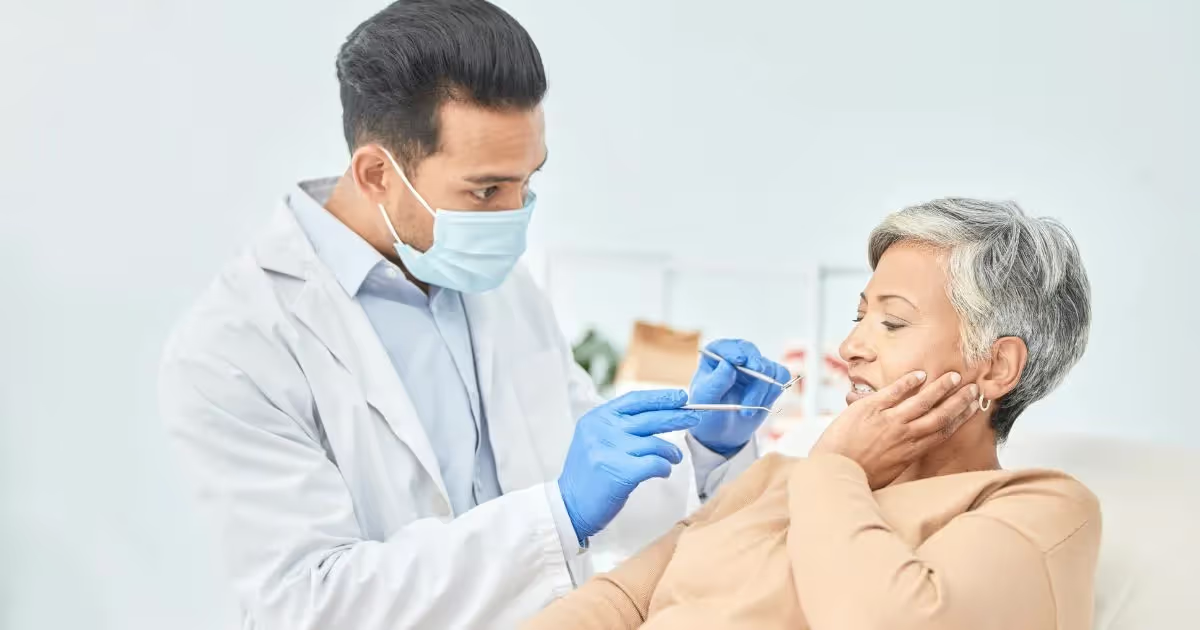How to Maintain Oral Health in the Elderly
Aging causes natural changes throughout the body, including the mouth. The condition of the teeth and gums can reflect alterations in cellular and tissue structure that occur with advancing years. Moreover, the use of certain medications in seniors can also impact oral health.
How Aging Affects Oral Health
With advancing years, the body’s capacity for cellular regeneration slows down, tissues become thinner and less resilient, and bone density and strength gradually decline. Simultaneously, the immune system weakens, rendering the body more susceptible to infections and prolonging the healing process compared to earlier in life. These physiological changes also affect the tissues and bones in the oral cavity, increasing the risk of developing oral health problems in seniors.
What Are the Common Oral Health Problems in the Elderly?
Dry Mouth
Saliva plays a critical role in maintaining oral health by preventing tooth decay and supporting healthy gums. When the salivary glands produce insufficient saliva, it increases the risk of:
- Taste disorders or difficulty chewing and swallowing
- Mouth ulcers
- Gum disease and tooth decay
- Oral fungal infections (Candida infections)
Diminished saliva production may result not only from the natural aging process but also from various health conditions. Factors contributing to dry mouth include commonly used medications, such as antihypertensives, cholesterol-lowering drugs, pain relievers, and antidepressants. The side effects of some cancer treatments can also lead to dry mouth.
Additionally, chronic illnesses such as diabetes, stroke, and Sjögren’s syndrome can compromise the salivary glands’ ability to produce adequate saliva.
Gum Recession and Gingivitis
Gum recession is a condition in which the gum tissue recedes from the tooth surface, exposing the root and increasing susceptibility to bacterial accumulation, which can lead to inflammation and tooth decay. Additionally, brushing too vigorously over time can also contribute to gum recession.
Gingivitis is an early stage of gum disease caused by the buildup of plaque and tartar, which irritates the gums and leads to inflammation.
Periodontitis is an advanced form of gum disease that damages the gum tissue and the underlying bone that supports the teeth, leading to tooth loss. Certain behaviors and health conditions in older adults may increase the risk of developing periodontitis, including:
- Failure to brush and floss daily
- Lack of regular dental care
- Smoking
- Diabetes
- Dry mouth
- A weakened immune system
Dental Caries
Dental caries is secondary to oral bacteria (found in dental plaque) that convert sugars and starches from food into acids. These acids gradually demineralize tooth enamel, leading to cavities.
Tooth decay is especially prevalent in older adults, often due to dry mouth, decreased ability to maintain adequate oral hygiene, the use of herbal toothpaste that lacks fluoride, and increased consumption of starchy and sugary foods.
Furthermore, dry mouth can facilitate bacterial accumulation in the oral cavity, further elevating the risk of dental caries.
Oral Cancer
Oral cancer affects individuals aged over 50 years and demonstrates a nearly threefold higher incidence in males compared to females. Smoking and tobacco use are the primary causes of oral cancer. Excessive alcohol consumption in conjunction with tobacco use markedly exacerbates the risk of developing oral malignancies.
Other risk factors include:
- Human papillomavirus (HPV) infection, the same virus responsible for genital warts and cervical cancer
- Poor oral hygiene
- Use of immunosuppressive medications
- Chronic irritation from rough teeth, ill-fitting dentures, or long-standing dental restorations
Oral Care Recommendations for Older Adults
Proper oral hygiene is essential for healthy teeth and gums at any age.
- Brush teeth twice daily with a soft-bristled toothbrush and fluoride-containing toothpaste.
- Use dental floss or interdental brushes at least once daily to clean areas between teeth that a toothbrush cannot reach.
- Limit sugary foods and beverages, as sugar serves as a substrate for cariogenic bacteria.
- Quit smoking or using tobacco products because they adversely affect the health of the gums and teeth.
- If experiencing dry mouth due to medication, consult your doctor to discuss possible alternatives or products that help maintain oral moisture, such as saliva substitutes.
- Schedule regular dental check-ups for professional assessment and proper oral hygiene instructions.
MedPark Hospital offers personalized oral health care tailored specifically to your individual needs, enabling a customized oral care plan designed just for you.
For more information, please visit
Seek dental consultation promptly if you experience any of the following symptoms:
- Toothache
- Swollen, red gums
- Dry mouth
- Oral ulcers
- White or red patches in the oral mucosa
- Bad breath
- Mobile or loose teeth
- Ill-fitting or loose dentures

Oral health and overall health are intimately interconnected. Poor oral health, particularly in older adults, can contribute to illness, malnutrition, and other complications stemming from gum and dental problems. Early dental assessment and the implementation of a personalized oral care plan represent the most effective strategies to prevent oral health issues that may arise with advancing age.







